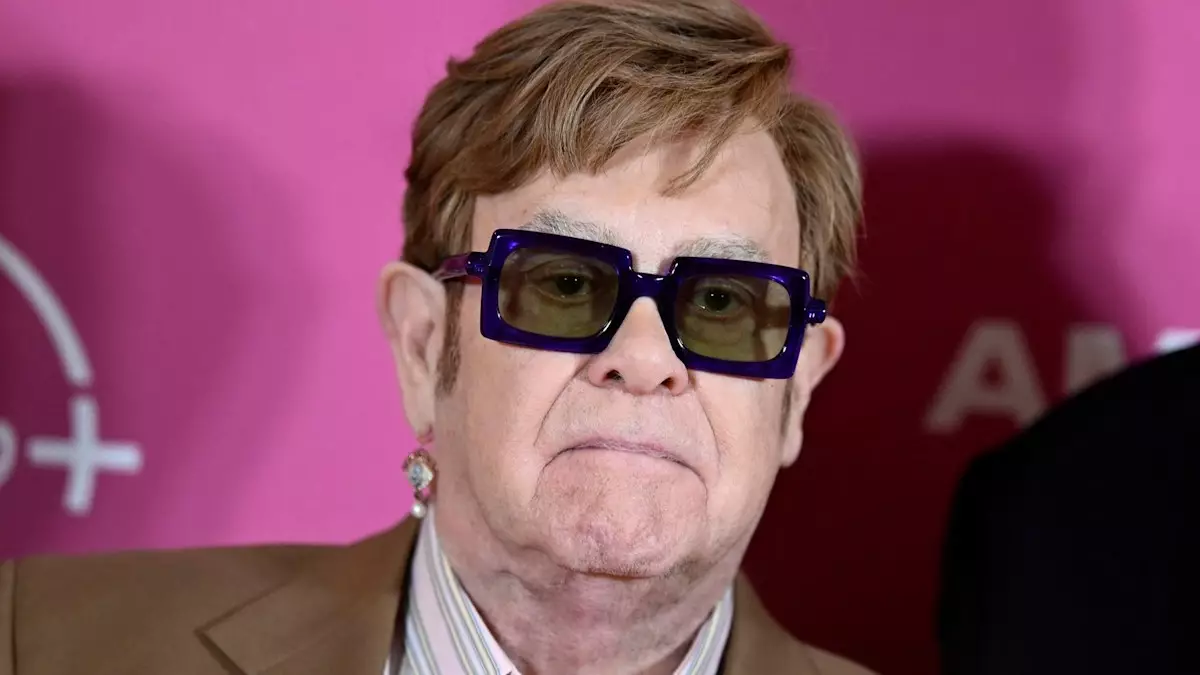Elton John, the revered musician known for his iconic hits and flamboyant persona, has recently shed light on a personal struggle that resonates far beyond the confines of his concert stage. At 78 years old, the “Rocket Man” is not only confronting the music industry’s challenges but also grappling with a profound health crisis—his battle with blindness. This battle paints a raw portrait of vulnerability, one that starkly contrasts with the glamour typically associated with celebrity life. John’s journey is an emblematic reflection of resilience, where fame and fortune meet the stark reality of human frailty.
In an open and heartfelt conversation with The Times, John revealed the emotional toll that his eyesight loss has taken on both himself and his family. Once able to enjoy the simple pleasure of watching his sons, Zachary and Elijah, engage in sports, he now finds himself confined to an existence where beloved pastimes have become painfully distant. John articulated the distress of not being able to witness his children’s growth and triumphs, emotions that undoubtedly resonate with any parent facing similar heartaches.
A Year of Turmoil and Reflection
Elton John’s admission of distress underscores the psychological burden that comes with sudden health setbacks, particularly when these threaten familial connections. While he expressed gratitude for the support of his husband, David Furnish, the emotional weight of his condition is palpable. The singer’s acknowledgment of his predicament—”It’s distressing. You get emotional, but you have to get used to it”—provides insight into his mindset: a balancing act of despair and appreciation. Here lies an admirable trait; even in the depths of sadness, there is an undertone of positivity, a testament to his character.
John’s health trials raise broader questions about how we define happiness and success. Is it merely the ability to perform, or is it found in the smaller moments shared with loved ones? As he reflects on his remaining sight in his left eye, we see a man grappling with the duality of being fortunate while mourning the loss of experiences most take for granted. This introspection may serve as a lesson to many: true resilience lies not in the absence of struggle, but in navigating through our plights with grace and gratitude.
Chronicling a Lifelong Journey with Health
The severity of John’s health issues does not stop at his eye condition. His trajectory has been marred by several significant health crises, including a prostate cancer diagnosis in 2017 that nearly cost him his life. His evocative recollection in his autobiography, detailing his prayers for survival and the devout hope of witnessing his children’s future, reveals a deeply human aspect of the superstar persona. The vulnerability he displays amplifies the message that fame does not shield individuals from life’s harshest realities—it merely changes the backdrop.
Furthermore, chronicling John’s health history highlights the not-so-glamorous side of celebrity life, where extraordinary health challenges often lie in the shadows of public adoration. The artist has navigated multiple surgeries, including hip and knee replacements, yet he chooses to approach these trials with humor. At the premiere of his documentary *Never Too Late*, his candid remarks about his various removed body parts reveal a powerful perspective: humor can serve as both a coping mechanism and a bridge connecting him to his audience.
Inspiring Generations Through Vulnerability
Elton John’s story, despite its somber tones, ultimately becomes an inspiration for many facing similar challenges. The singer embodies a courageous spirit, providing a narrative that encourages individuals to confront their struggles openly. He serves as a beacon of hope in a world often obsessed with superficiality, reminding us that vulnerability can be a form of strength.
Moreover, John’s story prompts a reevaluation of personal priorities in life. It illustrates the necessity to cherish the intimate moments with family and friends instead of getting lost in the noise of public acclaim. The challenges that come with personal battles can also lead to deeper connections—both with oneself and with loved ones. In this, John emerges not just as an artist, but as a relatable figure fostering communal resilience, aptly demonstrating that while we face different battles, our shared humanity can bring us together.

